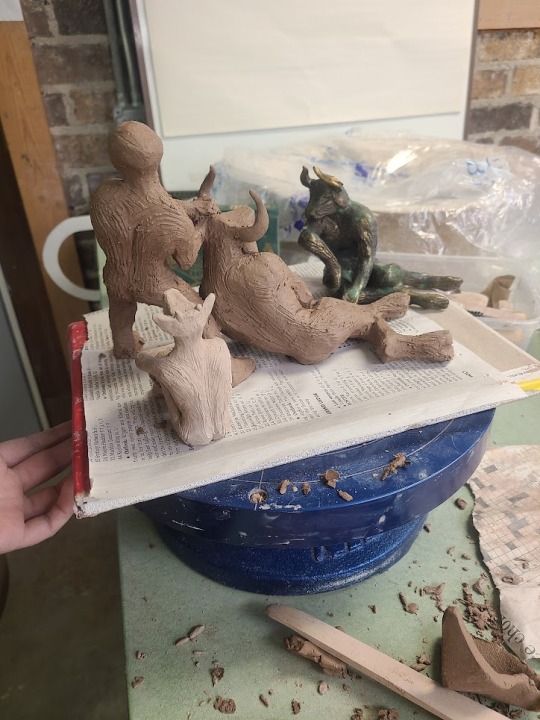#pottery is far and away my most expensive hobby and that means
Note
Have you taken any pottery classes or were you entirely self taught? I REALLY want to get into it but classes are quite expensive
I took some sculpting in undergrad, but it was in the context of casting and mold-making, not ceramics. So I'm fairly comfortable with clay as a medium but not so much with clay as an end product--not being able to do armatures and having to think about firing is weird. (If I had the opportunity to do bronze casting again, though, I would, no hesitation.) That puts me in the minority of my current pottery peers, who are largely self-taught or only learned in our studio.
I do pottery now at a co-op studio space, and technically that means that I'm taking classes there--but the classes are more like guided lab time? There's not really assignments or anything, and there's only a couple other people who sculpt, none of whom are in my class. Mostly the class just means that the person in charge demonstrates a technique or two once a week and then lets us do our thing.
Personally I think that shared studio space is the absolute best way to go. You spend less in startup costs (kilns are EXPENSIVE, running kilns is expensive, glaze is expensive) and it plugs you directly in to a group of fellow artists who can help and support you at whatever skill level you're at. Yes, classes are expensive--my class is $250 per season. But for me that includes lab space, 50 lbs of clay per season, almost all of the glaze I use, kiln time, and other people doing all the maintenance and kiln loading/unloading etc. Very much money well spent.
Artist-run shared spaces are often not turning a profit on anything with studio fees, just covering operations costs, so while it's pricey, it generally is just...what it costs to do that hobby. And it is sooooo much easier to be motivated when you're going to what is, basically, Grown-Up Art Club.

But if costs are prohibitive for you to do pottery via classes, and you want to learn to sculpt, then get some polymer clay and see what you can do. It's a different game than actual clay, but form is form, and the medium is secondary to figuring out how to translate an idea into reality.
Polymer clay is relatively affordable and doesn't require nearly the infrastructure of ceramics. If you can't spend the money on classes or a shared studio, then polymer clay is a great way to develop technique and an eye so that when you're in a position to spend the money, you already have the skills to make it worth what you're spending.
#most people who have home pottery studios are either in a position to easily afford that#or are selling their work at a caliber to justify the expenses of making the studio space#which is not what will happen when you are starting out.#pottery is far and away my most expensive hobby and that means#that when it's done#the Minotaur series is going to get sold#probably for as much as I think i can get for it#and probably that means I am going to have to Find A Gallery and Submit Work To Gallery and be#in short#in hell. i have not had to think about doing gallery submissions in so long#and i am dreading it.#anyway if anyone knows a gallery in like. michigan or chicago and can hook me up#i have some sad cows that need homes#i kind of want to keep my sad cow mans forever but also where would i even put them? better to be treasured by someone else#and maybe i will make one extra sad cow. for me.
286 notes
·
View notes